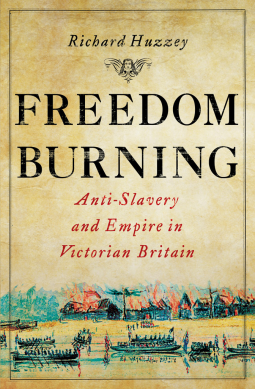
Freedom Burning
Anti-Slavery and Empire in Victorian Britain
by Richard Huzzey
This title was previously available on NetGalley and is now archived.
Send NetGalley books directly to your Kindle or Kindle app
1
To read on a Kindle or Kindle app, please add kindle@netgalley.com as an approved email address to receive files in your Amazon account. Click here for step-by-step instructions.
2
Also find your Kindle email address within your Amazon account, and enter it here.
Pub Date Aug 28 2012 | Archive Date Sep 01 2012
Description
After Britain abolished slavery throughout most of its empire in 1834, Victorians adopted a creed of "anti-slavery" as a vital part of their national identity and sense of moral superiority to other civilizations. The British government used diplomacy, pressure, and violence to suppress the slave trade, while the Royal Navy enforced abolition worldwide and an anxious public debated the true responsibilities of an anti-slavery nation. This crusade was far from altruistic or compassionate, but Richard Huzzey argues that it forged national debates and political culture long after the famous abolitionist campaigns of William Wilberforce and Thomas Clarkson had faded into memory. These anti-slavery passions shaped racist and imperialist prejudices, new forms of coerced labor, and the expansion of colonial possessions.In a sweeping narrative that spans the globe, Freedom Burning explores the intersection of philanthropic, imperial, and economic interests that underlay Britain's anti-slavery zeal— from London to Liberia, the Sudan to South Africa, Canada to the Caribbean, and the British East India Company to the Confederate States of America. Through careful attention to popular culture, official records, and private papers, Huzzey rewrites the history of the British Empire and a century-long effort to end the global trade in human lives.
Advance Praise
“For the first time in generations, someone has placed British anti-slavery in its widest political context to show how it came to dominate British politics in the nineteenth century. Freedom Burning is a wide-ranging, closely argued, and well-written history of the British commitment to anti-slavery. By putting politics front and center, Richard Huzzey successfully unravels the many legacies of the struggle against slavery and the slave trade and its global reach throughout the reign of Queen Victoria.”—Richard J. M. Blackett, Andrew Jackson Professor of History, Vanderbilt University, author of Building an Antislavery Wall: Black Americans in the Atlantic Abolitionist Movement, 1830-1860
“In the innovative and intriguing Freedom Burning, Richard Huzzey explores the global continuities and complexities of anti-slavery as ideology and policy, bridging the end of the ‘heroic’ period of British anti-slavery and the dawn of the twentieth century. The time span coincides with Victoria’s long reign and the apogee of Great Britain’s maritime and terrestrial global empire. Huzzey brings alive the interplay of British moral sentiments and symbols in relation to metropolitan realities through the voices of journalists, politicians, and government officials. The persistence, power, limitations, and contradictions of the long conversation in anti-slavery lie at the heart of this book.”—Seymour Drescher, University Professor of History, University of Pittsburgh, author of Abolition: A History of Slavery and Antislavery
“Freedom Burning gives us a new understanding of what it means to describe Britain after emancipation as an anti-slavery nation with an anti-slavery state and an anti-slavery empire. In this insightful book Richard Huzzey makes a powerful case for both the depth of anti-slavery sentiment and its deeply contradictory implications.”—Catherine Hall, University College London, author of Civilising Subjects: Metropole and Colony in the English Imagination 1830–1867
Available Editions
| EDITION | Other Format |
| ISBN | 9780801451089 |
| PRICE | $29.95 (USD) |
| PAGES | 312 |



